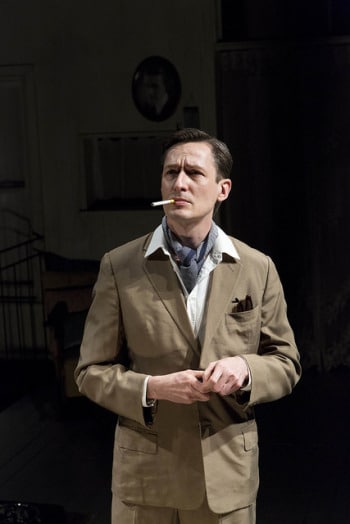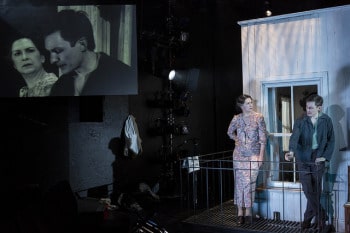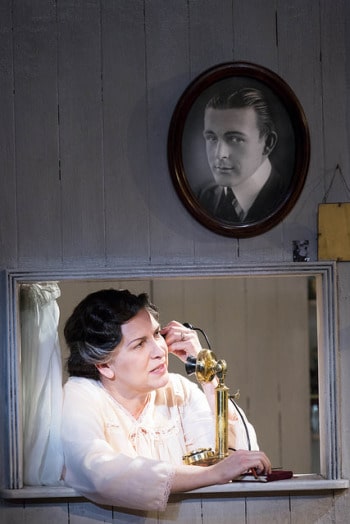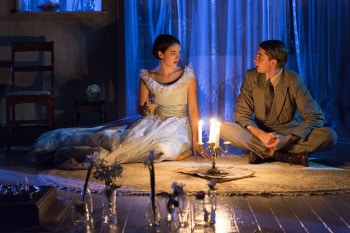The Glass Menagerie – Belvoir
There’s something about Eamon Flack’s directorial take on The Glass Menagerie, playing at Belvoir St. You don’t just watch it, you sink into it. The play wraps invisible tendrils around you and draws you in with a slow, gorgeous, sadness.
It’s the play that is closest to Tennessee Williams’ own life and family, one of the greatest plays in the canon, because of its depth. Flack, in his director’s notes, describes it as a “vision of munificence – a largeness of temperament, a beneficence, a sense of latter-day glory on earth – a very American vision, wonderful until it swells.”

This production swells, beautifully, the story of a family that will never be what it wants to be, that must excise the most vulnerable parts of itself to survive. The story of Amanda (Pamela Rabe), alone raising her children after her husband abandoned the family. The story of Tom (Luke Mullins), rife with queer discontent and something desperately unfulfilled. The story of Laura (Rose Riley), who, like Tennessee’s sister Rose, is imperfect, unfit for the rigors of daily society, but dearly loved for her core.
In the play, Tom and Laura’s bond is created almost entirely without words and it is utterly lovely, full of the silent codes of looks and tender/annoying gestures that are the DNA of family. It is the soul of the piece.
“I have a poet’s weakness for symbols,” Tom says, and he brings the play to life, a narrator and character both. The lights come down when his lighter flicks off; he reacts with momentary delight. The play is memory, it is illusion, and it is Tom’s creation. Everything is constructed from his own mind as something remembered, and it is impossible to forget Tom’s earlier words, ever: this play is a memory, and it is therefore unrealistic; it is truth in the pleasant disguise of illusion.
The house is lovingly constructed (design by Michael Hankin), shabby, but pretty inside the apartment. It lives between two screens which project in loving black-and-white whichever images Tom wants to show – he mans the cameras, moving them to highlight his impressions of the moments onstage and to make concrete this illusion. We linger on Laura’s face in her second-act dress, and the moment she no longer enjoys how she looks in it, when her mother tells her that is the prettiest she’ll ever be. We linger on her ill-fated kiss. We linger on Laura and Tom together in Laura’s bed, sibling-close. On Amanda, remembering the day 17 gentlemen called on her. Tom’s camera treats them carefully, reverently. Tom has taken his memory to the movies, a framework of behaviour as flimsy as Tom’s excuses about where he goes every night. The movies as industry, as metaphor: as flimsy and permanent as memory. It’s a perfect fit.

The screens flash up with those title cards as suggested: “This is my sister: celebrate her with strings!” Sometimes the images in the camera are rain-soaked, set up with a clear panel that Tom sprays with water. Sometimes Tom waves a piece of card in front of a window; the curtains flutter and frame Laura, capturing her with the beauty and loveliness that the rest of the world will probably never see, masked by her peculiarity. Already, Tom knows leaving her is unforgivable.
The fire escape, the symbol Williams calls upon to demonstrate the “slow and implacable fires of human desperation”, is Tom’s landing post. His limbo between self and the forces that tug upon a self; adventure, and crushing life at home. He stands and the light from the Paradise Dance Hall across the alley bathes over him, and all of us: a slow-turning glass ball of purple light, projected on the set as bubbles, as memory, as bursts of that frustrating something we can never quite tame or reach.

Luke Mullins, one of the greatest actors on Australian stages – probably any stages – fills Tom with an incredibly deep well of humanity. Laced with affectations and frustrations, his eyes are full of feeling. He watches the play and hurts with what he knows is coming; he is in the play and he rages. His touch with Laura is delicate: even the camera’s eye, in Tom’s hands, loves her. He is horrified when his mother squeezes into her old, ill-fitting cotillion dress; he finds clumsy excuses to touch the dashing Jim O’Connor, who disarms Tom every single time he calls him Shakespeare.
Harry Greenwood is a warm, instantly likable Gentleman Caller; he finds his rhythm with the delicate still waters running deep in Riley’s Laura; they are captivating together. Riley is trapped by her anxiety (which is astonishingly real and keenly felt in this production), and by her slight ‘defect’. By her inability to declare herself beyond wordless shouts, beyond tears, beyond tight-clinging hugs, beyond repeated admission of failure. Riley’s Laura is viscerally felt because it is deeply accessible and quietly recognisable; there are parts of Laura in all of us, whether we want to admit it or not.
And then there is Pamela Rabe as Amanda, faded Southern Belle, the mother who wants everything she doesn’t have, and can’t accept that she won’t have it. When Laura withdraws in terror from business school, Rabe’s Amanda asks her pleadingly, “So what are we going to do for the rest of our lives?” her future tangled with the one of her daughter. When she giddily speaks of jonquils, her youthful obsession and her youthful vivacity come right back, she giggles girlishly, but it doesn’t quite fit in her adult, motherly body; she is the Laura that Laura never will be. She stares down Tom, she throws herself at him, trying to either understand him or make him understand her – they are locked into the inevitability of their futures. Tom will leave, just like his father, and Amanda will be left with no hope whatsoever. Rabe is resplendent in this role.

Eamon Flack understands this play and he directs it with a sense of gravity and grace; he floats over the light moments, the flickerings of fun and the laughter.
And then, when the inexorable sadness comes, it sinks like a stone and stays there: disappointment, discouragement, the inevitable brokenness – and not the refracting hopefulness – of a tiny glass unicorn.
Belvoir’s Glass Menagerie is achingly beautiful. It is the visible alleys and laneways of love and regret. It is faultless. The finest production of the year.



